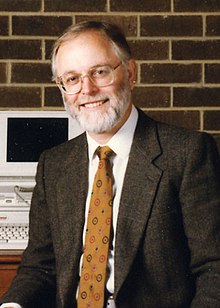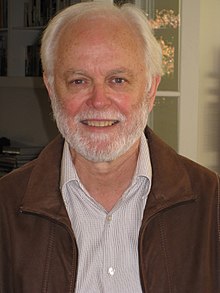Process philosophy, also ontology of becoming, or processism, is an approach in philosophy that identifies processes, changes, or shifting relationships as the only real experience of everyday living. In opposition to the classical view of change as illusory or accidental, process philosophy posits transient occasions of change or becoming as the only fundamental things of the ordinary everyday real world.
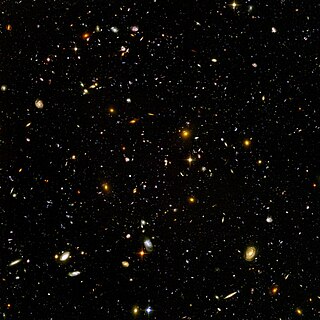
In its most general sense, the term "world" refers to the totality of entities, to the whole of reality or to everything that is. The nature of the world has been conceptualized differently in different fields. Some conceptions see the world as unique while others talk of a "plurality of worlds". Some treat the world as one simple object while others analyze the world as a complex made up of many parts. In scientific cosmology the world or universe is commonly defined as "[t]he totality of all space and time; all that is, has been, and will be". Theories of modality, on the other hand, talk of possible worlds as complete and consistent ways how things could have been. Phenomenology, starting from the horizon of co-given objects present in the periphery of every experience, defines the world as the biggest horizon or the "horizon of all horizons". In philosophy of mind, the world is commonly contrasted with the mind as that which is represented by the mind. Theology conceptualizes the world in relation to God, for example, as God's creation, as identical to God or as the two being interdependent. In religions, there is often a tendency to downgrade the material or sensory world in favor of a spiritual world to be sought through religious practice. A comprehensive representation of the world and our place in it, as is commonly found in religions, is known as a worldview. Cosmogony is the field that studies the origin or creation of the world while eschatology refers to the science or doctrine of the last things or of the end of the world.
Cosmogony is any model concerning the origin of the cosmos or the universe.

Alfred North Whitehead was an English mathematician and philosopher. He is best known as the defining figure of the philosophical school known as process philosophy, which today has found application to a wide variety of disciplines, including ecology, theology, education, physics, biology, economics, and psychology, among other areas.

Economic history is the study of history using methodological tools from economics or with a special attention to economic phenomena. Research is conducted using a combination of historical methods, statistical methods and the application of economic theory to historical situations and institutions. The field can encompass a wide variety of topics, including equality, finance, technology, labour, and business. It emphasizes historicizing the economy itself, analyzing it as a dynamic entity and attempting to provide insights into the way it is structured and conceived.
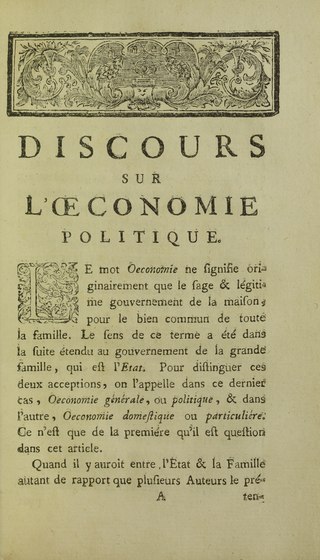
Political economy is the study of how economic systems and political systems are linked. Widely studied phenomena within the discipline are systems such as labour markets and financial markets, as well as phenomena such as growth, distribution, inequality, and trade, and how these are shaped by institutions, laws, and government policy. Originating in the 16th century, it is the precursor to the modern discipline of economics. Political economy in its modern form is considered an interdisciplinary field, drawing on theory from both political science and modern economics.

Harold Adams Innis was a Canadian professor of political economy at the University of Toronto and the author of seminal works on media, communication theory, and Canadian economic history. He helped develop the staples thesis, which holds that Canada's culture, political history, and economy have been decisively influenced by the exploitation and export of a series of "staples" such as fur, fish, lumber, wheat, mined metals, and coal. The staple thesis dominated economic history in Canada from the 1930s to 1960s, and continues to be a fundamental part of the Canadian political economic tradition.
The economy of governments covers the systems for setting levels of taxation, government budgets, the money supply and interest rates as well as the labour market, national ownership, and many other areas of government interventions into the economy.

An academic discipline or field of study is a branch of knowledge, taught and researched as part of higher education. A scholar's discipline is commonly defined by the university faculties and learned societies to which they belong and the academic journals in which they publish research.
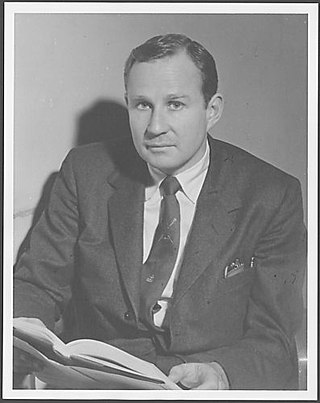
Wilfrid Stalker Sellars was an American philosopher and prominent developer of critical realism, who "revolutionized both the content and the method of philosophy in the United States".
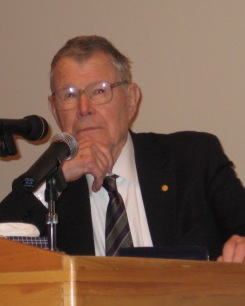
Thomas Crombie Schelling was an American economist and professor of foreign policy, national security, nuclear strategy, and arms control at the School of Public Policy at University of Maryland, College Park. He was also co-faculty at the New England Complex Systems Institute. He was awarded the 2005 Nobel Memorial Prize in Economic Sciences for "having enhanced our understanding of conflict and cooperation through game-theory analysis."
A price signal is information conveyed to consumers and producers, via the prices offered or requested for, and the amount requested or offered of a product or service, which provides a signal to increase or decrease quantity supplied or quantity demanded. It also provides potential business opportunities. When a certain kind of product is in shortage supply and the price rises, people will pay more attention to and produce this kind of product. The information carried by prices is an essential function in the fundamental coordination of an economic system, coordinating things such as what has to be produced, how to produce it and what resources to use in its production.
Applied economics is the study as regards the application of economic theory and econometrics in specific settings. As one of the two sets of fields of economics, it is typically characterized by the application of the core, i.e. economic theory and econometrics to address practical issues in a range of fields including demographic economics, labour economics, business economics, industrial organization, agricultural economics, development economics, education economics, engineering economics, financial economics, health economics, monetary economics, public economics, and economic history. From the perspective of economic development, the purpose of applied economics is to enhance the quality of business practices and national policy making.
The following outline is provided as an overview of and topical guide to metaphysics:
Thomas James Snooks (1890–1958) was a pioneering picture-show man and a developer-builder in the north-eastern suburbs of Perth, Western Australia. In addition to his professional interest in cabinet-making and building, Tom possessed a love for live theatre, staging a number of Gilbert and Sullivan productions in the Maylands Methodist hall, when he was in his early twenties. Not long after the First World War he began showing silent films at a number of venues in Maylands - at the Maylands town hall and the old Lyric Theatre - as well as in Bassendean, and Inglewood, under the business name Central Pictures. By staggering the starting times, Tom and his brothers were able to shuffle canisters of film between competing venues via a speeding motor cycle, thereby keeping the local police force on its toes. In the early days, Tom would go on stage to introduce the silent films, as he believed in the power of the word as well as the image.
Ernesto Screpanti is a professor of Political Economy at the University of Siena. He worked on the “rethinking Marxism” research programme, in the attempt to update Marxist analysis by bringing it in line with the reality of contemporary capitalism, on the one hand, and to liberate Marxism from any residue of Hegelian metaphysics, Kantian ethics and economic determinism, on the other.

Complex systems biology (CSB) is a branch or subfield of mathematical and theoretical biology invented by Robert Rosen concerned with complexity of both structure and function in biological organisms, as well as the emergence and evolution of organisms and species, with emphasis being placed on the interconnectivity of, and within, biological network inference, and on modelling the fundamental relations inherent to life.
This is a list of philosophical literature articles.

The Great Barrington Declaration was an open letter published in October 2020 in response to the COVID-19 pandemic and lockdowns. It claimed harmful COVID-19 lockdowns could be avoided via the fringe notion of "focused protection", by which those most at risk could purportedly be kept safe while society otherwise took no steps to prevent infection. The envisaged result was herd immunity within three months, as SARS-CoV-2 swept through the population. Authored by Sunetra Gupta of the University of Oxford, Jay Bhattacharya of Stanford University, and Martin Kulldorff of Harvard University, it was drafted at the American Institute for Economic Research (AIER) in Great Barrington, Massachusetts, signed there on 4 October 2020, and published on 5 October. At the time, COVID-19 vaccines were considered to be months away from general availability. The document presumed that the disease burden of mass infection could be tolerated, that any infection would confer long term sterilizing immunity, and it made no mention of physical distancing, masks, contact tracing, or long COVID, which has left patients with debilitating symptoms months after the initial infection.
The Great Reset Initiative is an economic recovery plan drawn up by the World Economic Forum (WEF) in response to the COVID-19 pandemic. The project was launched in June 2020, with a video featuring the then Prince of Wales Charles released to mark its launch. The initiative's stated aim is to facilitate rebuilding from the global COVID-19 crisis in a way that prioritizes sustainable development.
